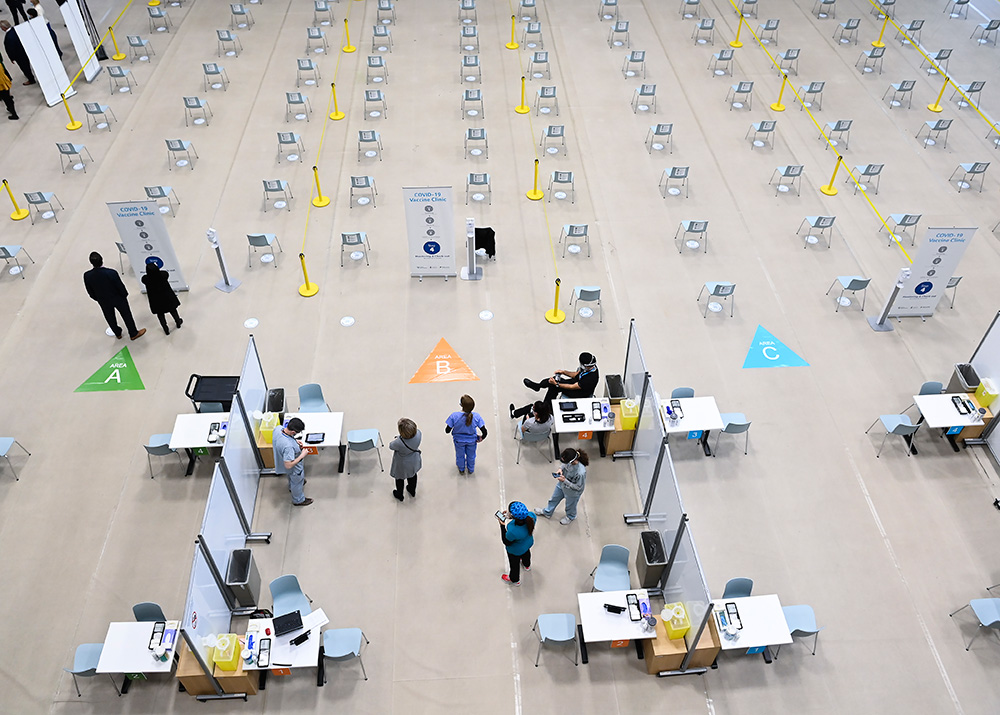Compiled by veteran medical journalist Brian Owens, this roundup of some of the newest science on the COVID-19 pandemic, straight from the scientific journals, is presented by Hakai Magazine in partnership with The Tyee.
Virus variants can avoid antibodies
The evidence is growing that many of the newer variants of the SARS-CoV-2 virus currently circulating can resist or avoid the antibodies that should give us immunity to the disease. Two studies tested the ability of antibodies to neutralize variants, including the ones that arose in the United Kingdom and South Africa late last year, and found that they were less effective at blocking the variant viruses. Whether a person was vaccinated or acquired the virus through infection, the result was the same. This may mean vaccines will need to be regularly updated to keep up with the virus’s evolution.
Nature Medicine, March 4, 2021
COVID-19 complications in children due to active immune system
Though most children who get COVID-19 have only mild symptoms, some end up with a more serious condition known as Multisystem Inflammatory Syndrome in Children, which is characterized by fever, gastrointestinal issues and heart problems — but not the respiratory symptoms typical of severe COVID-19.
Now, researchers have taken a close look at how the immune systems of these children respond to the virus. They found that children affected by MIS-C have highly activated immune systems that are similar to those of adults with severe COVID-19. This can be seen in the heightened activity of CD8+ T cells, a kind of immune cell. The researchers suggest that the condition may be driven by persistent SARS-CoV-2 infection, by a secondary infection with another virus, or an autoimmune response.
Science Immunology, March 2, 2021
Lockdown drives us to make bad choices
The shock produced by the COVID-19 pandemic and associated lockdowns has reduced people’s cognitive capacity, leading them to take more risks and make poorer choices, according to a study of people in three European countries during the first and second waves of the pandemic.
People who experienced more of the negative effects of lockdown experienced more diminished cognitive capacity and tended to make decisions that prioritized immediate short-term benefits. They made riskier decisions that might increase their likelihood of infection, and suffered reduced civic-mindedness, such as a tendency to be less altruistic and increased desire to punish others.
Scientific Reports, Feb. 11, 2021
Hotel-based quarantine for homeless people is safe and effective
A program in San Francisco that provides hotel rooms, medical care and behavioural health support for homeless people who needed to isolate or quarantine for COVID-19, has proved to be a safe and effective way of reducing the risk to this vulnerable population and to the community. A study of the program found that 81 per cent of participants completed their quarantine, and just four per cent of those who had been transferred to the hotel from a hospital had to be readmitted because of COVID-19 complications.
JAMA Network Open, March 2, 2021
Carbon emissions fell, but had little long-term effect
Global carbon dioxide emission fell by around seven per cent in 2020 compared with 2019, primarily as a result of policies to slow the spread of COVID-19. The drop was larger, around nine per cent, in both high-income and low-income countries, and smaller, around five per cent, in middle-income countries. But these short-term, temporary reductions will likely have only a small and practically undetectable impact on global and regional climates.
Nature Climate Change, March 3, 2021
Science Advances, March 5, 2021
Delayed skin reactions to Moderna vaccine
Doctors and patients should be aware that large skin rashes can develop at the injection site of the Moderna COVID-19 vaccine several days after the shot is given, say researchers. The large, red, sometimes raised, itchy or painful skin reactions are rare. They can usually be treated with ice and antihistamines and should not discourage people from getting the second dose of the vaccine, the researchers say.
New England Journal of Medicine, March 3, 2021

Twitter messages about social distancing linked to decreased mobility
An increase in the number of Twitter messages in a given area containing keywords such as “stay home,” “stay safe,” “wear mask,” “wash hands” and “social distancing” is associated with a local decrease in mobility the following day. Researchers say these social media messages could both reveal the behaviour of the people sending them and influence the behaviour of others.
Large number of COVID-19 survivors may have cognitive problems
A large proportion of COVID-19 patients will be affected by neuropsychiatric and cognitive complications, warn researchers. A review of existing research found a wide range of neuropsychiatric problems. One study found that 95 per cent of clinically stable COVID-19 patients had post-traumatic stress disorder, and others found between 17 to 42 per cent of patients experienced disorders such as depression. Large proportions of patients also reported impaired attention, memory problems and fatigue in both the short and longer-term.
Frontiers in Psychology, March 2, 2021
Intellectual disability is second-biggest risk factor for death from COVID-19
Intellectual disabilities are second only to old age as a risk factor for dying from COVID-19. A study of more than 64 million patient records in the United States found that those with intellectual disabilities were 2.5 times more likely to contract COVID-19, about 2.7 times more likely to be admitted to the hospital, and 5.9 times more likely to die from the infection than the general population. The researchers say patients with intellectual disabilities may be less able to comply with strategies that reduce the risk of infection, such as masking and social distancing, and they are more likely to have additional health conditions that contribute to a more severe course of COVID-19.
Masks are fine during intense exercise
Wearing a face mask has only a small effect on the ability of healthy people to do vigorous exercise. Researchers carried out detailed testing on breathing, heart rate, blood pressure and the levels of oxygen in the blood on people while they were using an exercise bike with and without a mask. They did find differences in some measurements between those who were wearing a mask and those who were not. For example, masks limited people’s ability to perform aerobic exercise — as measured by their peak VO2, a measurement of their highest possible oxygen intake — by about 10 per cent. None of the results indicated that wearing a mask while exercising poses any risk to health.
European Respiratory Journal, March 7, 2021 ![]()
Read more: Coronavirus, Science + Tech
















Tyee Commenting Guidelines
Comments that violate guidelines risk being deleted, and violations may result in a temporary or permanent user ban. Maintain the spirit of good conversation to stay in the discussion.
*Please note The Tyee is not a forum for spreading misinformation about COVID-19, denying its existence or minimizing its risk to public health.
Do:
Do not: